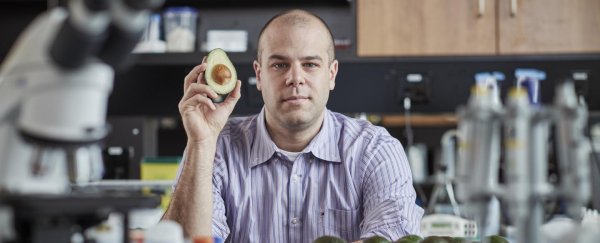Canadian researchers have shown that molecules derived from avocados can help to treat a form of leukaemia by targeting the root cause of the disease - its stem cells.
The team is now trialling a drug based on the avocado lipid, and believe that it could help to greatly improve life expectancy and quality of life of patients suffering from acute myeloid leukaemia (AML).
"It's an exciting time for our lab … Not only does avocatin B eliminate the source of AML, but its targeted, selective effects make it less toxic to the body, too," research leader Paul Spagnuolo from the University of Waterloo in Canada said in a press release.
AML is a devastating form of leukaemia that kills 90 percent of patients aged over 65 in just five years. The avocado molecule, which is called avocatin B, works by triggering cell death in AML stem cells, stopping the cancer from spreading. But the researchers found that it doesn't have this same effect on healthy blood stem cells.
"The stem cell is largely responsible for the disease developing and it's the reason why so many patients with leukaemia relapse," said Spagnuolo. "We've performed many rounds of testing to determine how this new drug works at a molecular level and confirmed that it targets stem cells selectively, leaving healthy cells unharmed."
The results of these tests have been published in the journal Cancer Research, and show that avocatin B is able to target these leukaemia stem cells so specifically because of the unique way their mitochondria function. The mitochondria are the organelles that produce energy for the cell, and this unusual function is what allows the leukaemia cells to proliferate so rapidly in the blood stream. But it also sensitises them to avocatin B, and allows the lipid to trigger cell death uniquely in these cancerous cells.
The team has now applied for a patent for avocatin B, and is investigating commercial partnerships with the hope that they can begin Phase I clinical trials in humans within the next year. However, it will still take years of testing before the drug is approved as a oncological treatment.
The drug is what's known as a type of nutraceutical, which applies the pharmaceutical industry's strict testing methods to food-derived compounds. It's one of the first molecules that has been found to target leukaemia stem cells, and the research on how it attacks these cells on a molecular level could lead to new treatments for other types of cancer and diseases.
"This approach provides a clearer understanding of how the nutraceutical works, and it means we can reproduce the effects more accurately and consistently," said Spagnuolo. "This is critical to safely translating our lab work into a reliable drug that could be used in oncology clinics."
